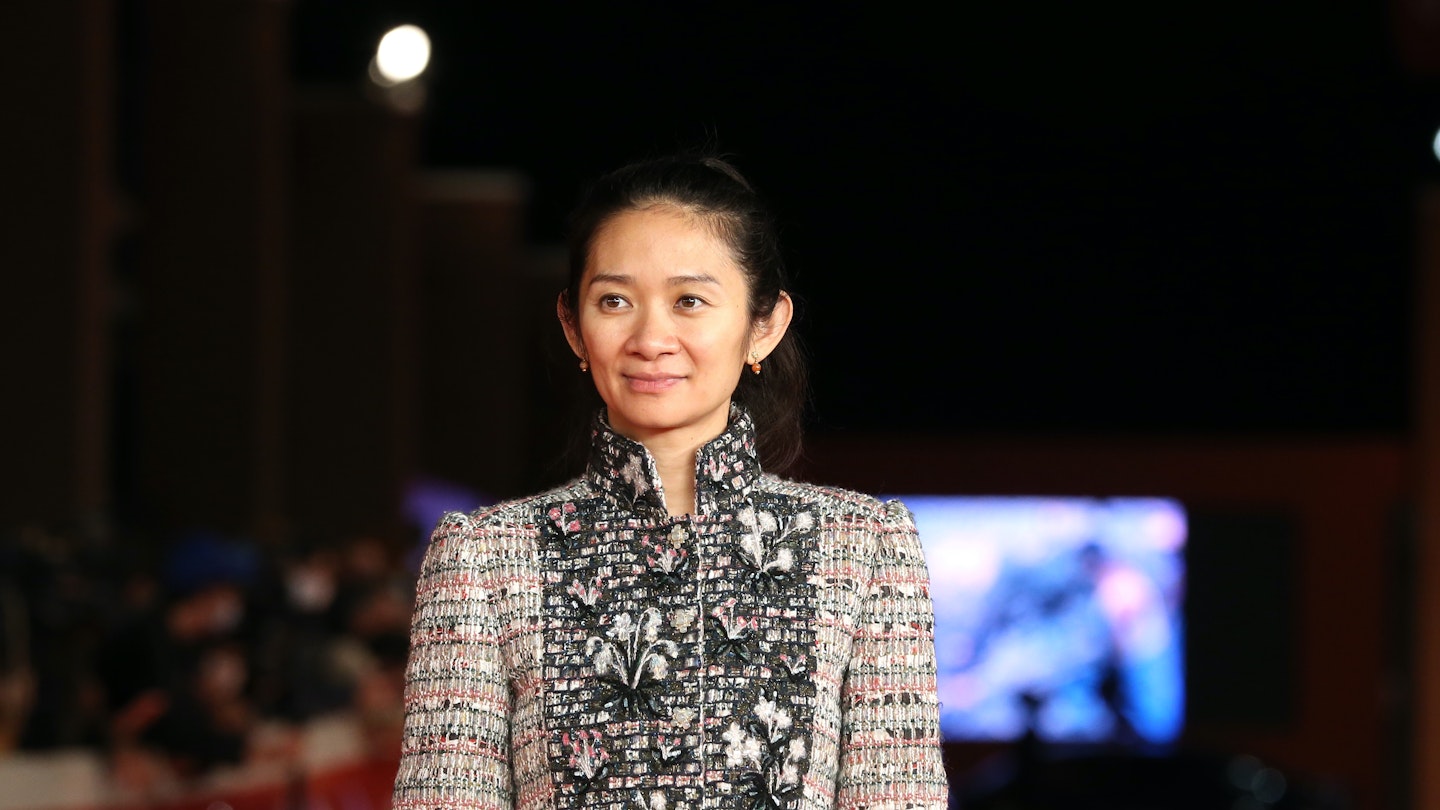Warning: contains spoilers for Eternals
Even given Marvel's penchant for hiring directors from the indie world (hitting pay dirt with the likes of Jon Favreau and the Russos), Chloé Zhao seemed an unlikely choice to handle – or even want to handle – a huge MCU film. Yet as it turns out, Zhao is a dyed-in-the-wool geek, who grew up on anime and Star Wars.
She merged her naturalistic, location-based filmmaking approach with Marvel's trademark superhero action for Eternals, in which a group of seemingly immortal heroes must protect the Earth from creatures known as Deviants. Gemma Chan, Richard Madden, Kumail Nanjiani, Angelina Jolie, Salma Hayek, Brian Tyree Henry, Lauren Ridloff, Lia McHugh, Kit Harrington, Don Lee and Barry Keoghan are among the sprawling cast for an adventure that spans millennia and forever changes how we think about the MCU.
Naturally, because this is an extract from our chat with the director on the Eternals Spoiler Special, we get into a lot of plot chat – so if you haven't seen the movie, don't read on. For the full chat, you can subscribe to the Empire Spoiler Special Podcast feed. Check out some highlights below.
A fairly big chunk of this movie shot in Camden, where the Empire office is. What was it about Camden? What lured you there?
It's funny because I have a lot of British people in my life, and when I decided to shoot in London for this sequence in the film, the places that were offered to me were quite standard places. Then my partner, who's the camera operator on Eternals, said, "We'll go somewhere a bit more cooler than that. Come on." The bar we shot in is a place where Kit lives across the street. Gemma, Richard, it was everybody's old stomping ground. Everyone had a story.
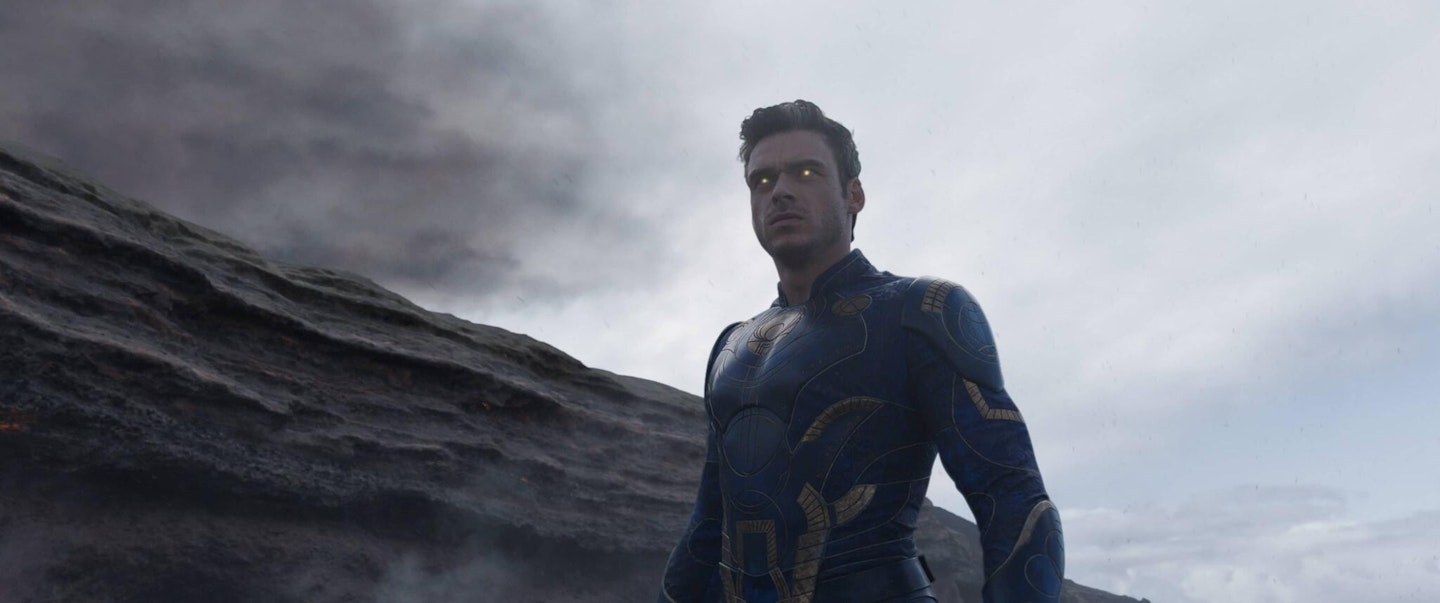
A question on everybody's lips after they see Eternals has to be the various mentions in the movie of Batman and Superman. Where did they come from?
I take responsibility for that. I just believe we all should live in one big happy family. And also, you know, we can talk about the elephant in the room – which is that Ikaris [Madden] reminds people of Superman. There are many brilliant filmmakers who've brought Superman to the screen in their own modern interpretation of this beloved mythology that exists in many cultures. So I just felt it's great to pay tribute, it's great to acknowledge these iconic interpretations of Superman. In Eternals, Gilgamesh [Lee], watches his movies while he's looking after Thena [Jolie]. You will see that there's going to be a deleted scene where he talks about another film that's gonna make you smile. And he loves Batman movies.
Perhaps the biggest theme of the movie is about faith and belief and dogma, and how doggedly people will cling to that. Can you talk about approaching that theme and filtering it through those characters in that way?
I appreciate you picking up on that, because this is one of the main reasons that drew me to this story when I first read the treatment. I think of the moment when human civilization has shifted from deism to humanism, when many of us were starting to question the existence of Gods. We started to ask ourselves, "Are we responsible to give meaning to the cosmos now? It's a lot of responsibility." In modern society, there's a lot of anxiety. And for better or for worse, we're asking this question, "Is there a bigger plan out there? Is there a higher power? Are we part of this grand design? And if so, do we have the right to break out of it?" This is a question that I asked myself a lot. To be able to explore these themes in a genre that kind of was born out of that...I think we've asked this question since the dawn of time. Each character represents some population in terms of how they view their relationship with God, or this grand design and, and how they might evolve and change.
Ajak [Hayek], Kingo [Nanjiani] and Ikaris; those three have faith in our film. They do believe that human beings have no right to break out of the natural order, because so many more are going to be created. Ajak made a mistake; she had to believe the people on this planet are her children. And she decided to choose love. Ikaris held on to his beliefs and killed her. And Kingo has confirmed the beliefs, but he refused to hurt people for it. That's a very difficult thing for a superhero to do in Act Three of a superhero film – to step back and not fight and not hurt anybody.
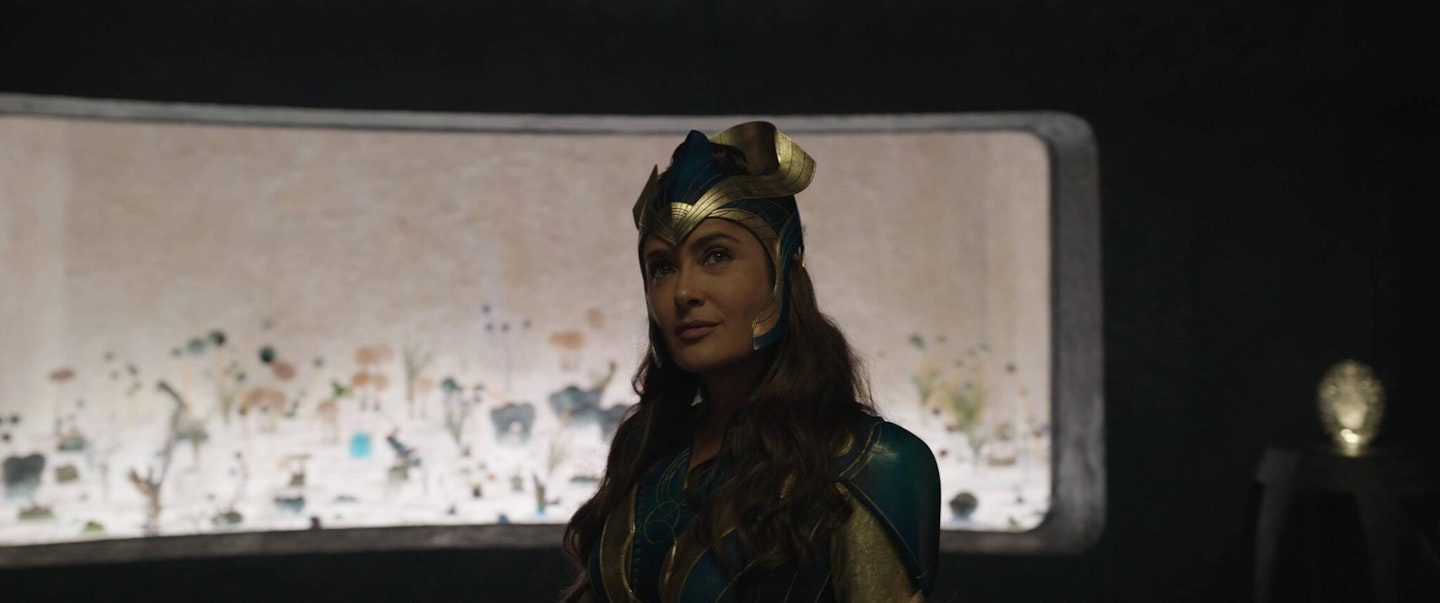
Ever since Han Solo returns at the end of Star Wars to save the day, we've been conditioned to expect a character who's reluctant in the final confrontation, to come back in and help out. Kingo doesn't do that. That's a really bold decision.
We talked a lot about – what does it mean to be heroic? I feel we're entering a revisionist period for this genre. I feel the desire from the studios and from the audience. There's something about celebrating feminine strength, both in men and women in this film, that was very important for us. I think Sersi [Chan] is the bravest of all, because no matter how much someone wronged her, she's able to forgive them, to show them love instead of punch them in the face. She stays open and vulnerable, and that actually brought down the strongest, most powerful being.
There's probably a version of this movie where the last 20 minutes is the Celestials battling and special effects all over the place, but it's not that. The end of the movie is the creation of the of the 'uni-mind', with compassion and love overcoming that sense of destiny; overcoming violence.
I remember reading the treatments thinking to myself, 'Oh man, this is gonna be... really? So the climax moment of a superhero film is two people looking at each other, remembering that they love each other?'' I thought, 'This is the most exciting thing ever, and boy, am I gonna get myself in trouble.' But I just give a lot of props to Marvel and also to the actors. It's a very brave thing to do in today's climate – for Gemma to come in to the superhero genre as a woman, an Asian woman, who is not afraid to remain gentle and vulnerable, and not feel like she has to punch and be loud. That's a brave thing to do.
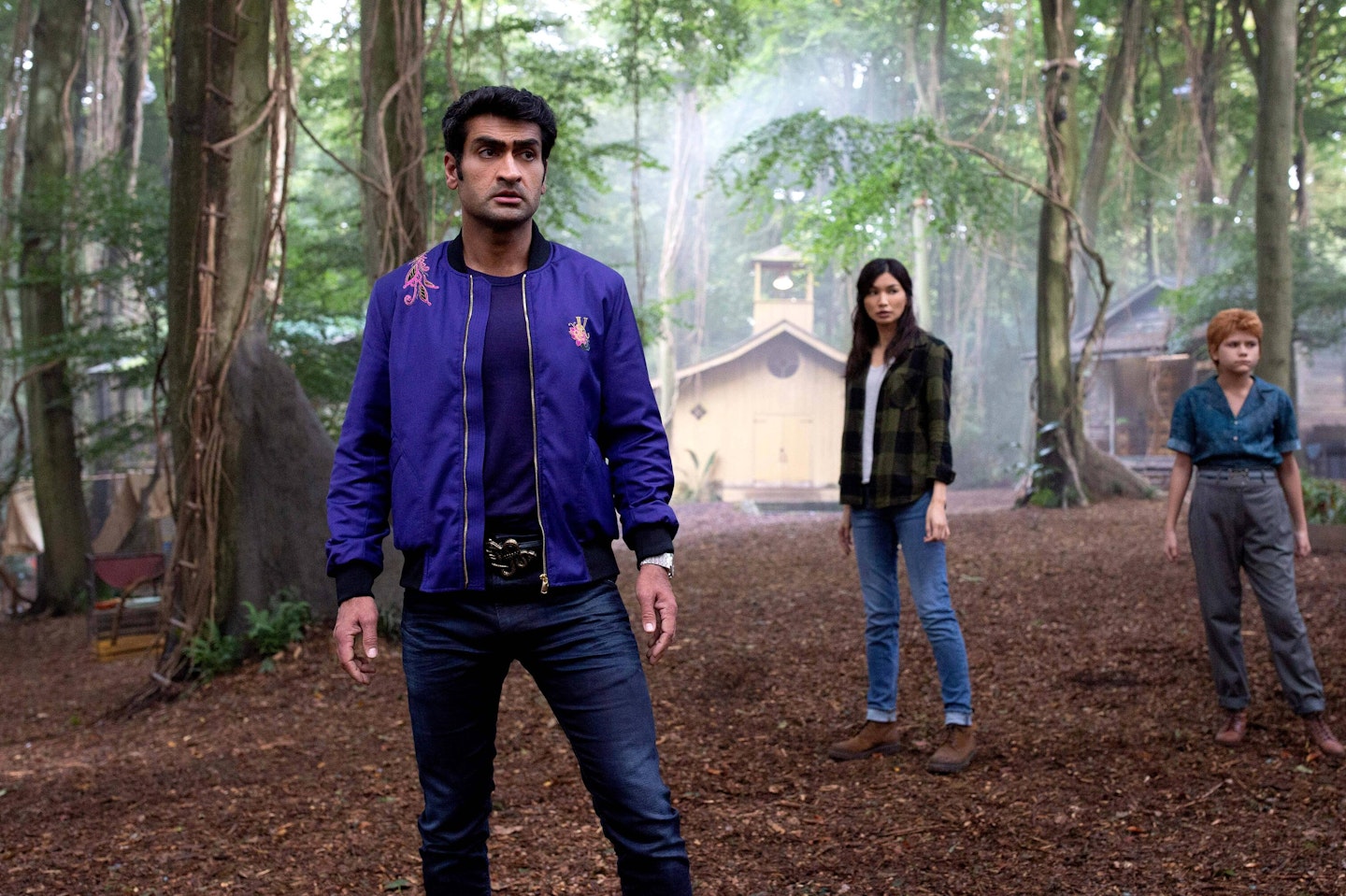
I wanted to talk about the depiction of the Mahd Wy'ry and Thena's mental health struggles. It's really refreshing and bold, especially for a movie like this. How much discussion was there about that aspect of the film?
It was very much in the treatment that I read. We're talking about one of the strongest female warriors out there in myth, and then we're talking about breaking her down to a point where she's lost herself. She can battle anyone else. But she can't protect herself from herself, not with strength, and not with power. When Angie came in, it just all clicked, because the way I work is – I very much depend on my actors to show me who these characters are, to really bring something human and personal. I need that from them. Angie immediately clicked with Thena's arc because she herself has dealt with things like that in her life. She has gone through similar things, trauma and stuff like that. From the very beginning, she said, "Chloe, we gotta have Thena stay feminine, stay vulnerable, break her down. I'm willing to go there". That's very Important, to know that you could be messy, you could have fallen apart and yet you could still be strong at the same time. And also for such a strong women to not be afraid to lean the shoulder of a strong man. That partnership Then and Gilgamesh have; she's not afraid to lean on him, and that was important for Angie.
Was part of the decision behind killing Gilgamesh to almost remove that protector from her life?
Yeah. She had no choice but to embrace her vulnerability, her messiness. Before, she had Gilgamesh and he gave her the most important thing: "remember, you have it in yourself." She can't fight it with fire, she's got to let that that water come in. Thena needed to lean into the soft side of her, and remember the memories that are going to heal her. This was written in the treatment, but losing Gilgamesh is a tough thing for the whole group.
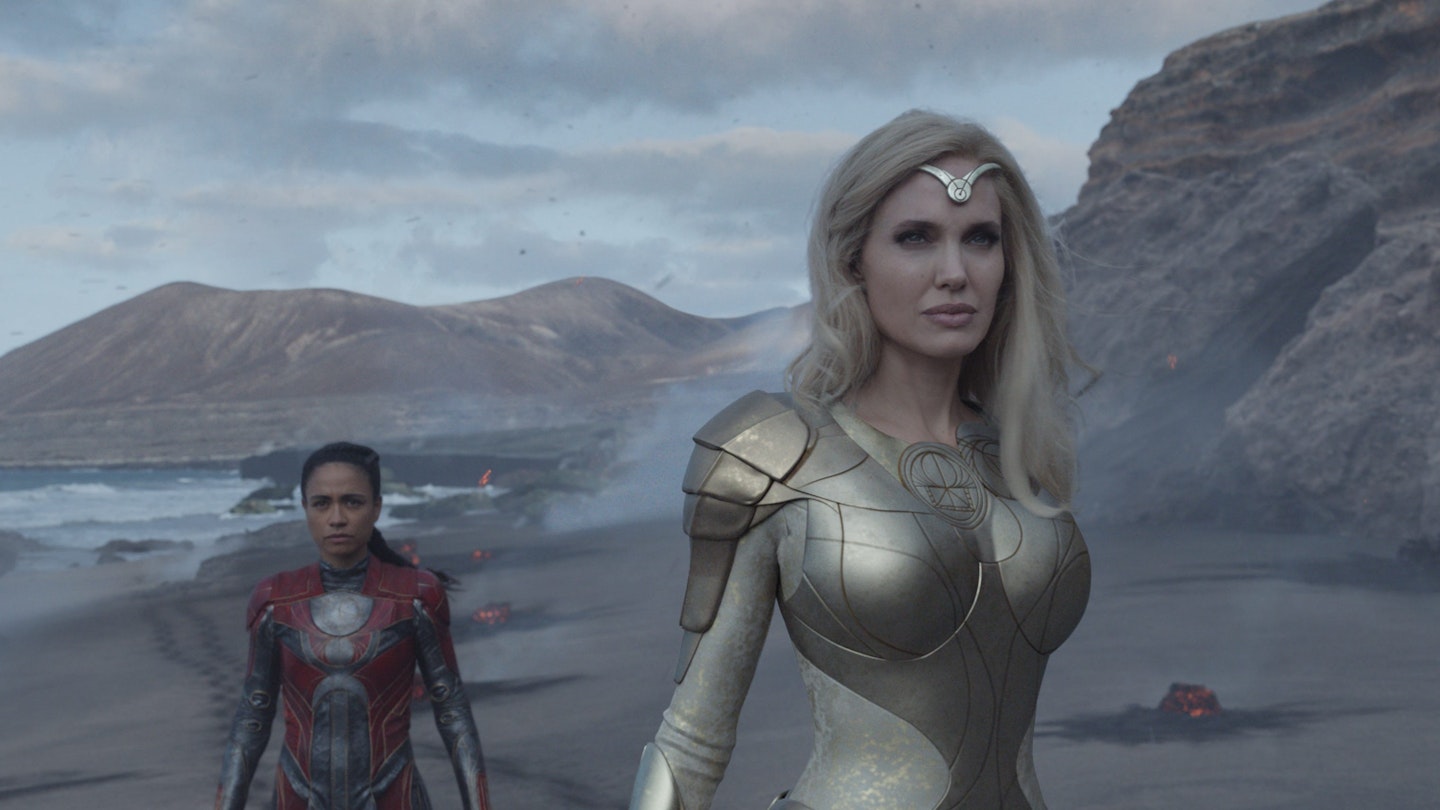
You end the film with several of our heroes being whisked away to God knows where, to face God knows what, and the final shot is of Dane Whitman [Harrington] looking a little bit bereft, but also determined to do something about it. Was that always how the film ended for you?
No. I have never made a film where the ending is what I wrote! You find it in the edit. Editing is a third of the filmmaking process, and when you show it to people, that's when you find the ending. I don't think I've made a single film where the opening and ending stay the same as the script, just because the scenes are fluid as we shoot. And we actually had another ending that is really bleak. Bleak. I didn't hate it, because I'm used to films that are more melancholy. But I don't think it went down well with audiences.
How bleak are we talking here?
It used to end with everybody back on the ship, minds erased and just going on to another planet, like The Twilight Zone. I remember when it goes to black, everyone was like, "I don't know what to do." And also, it's the MCU, and you want to be excited for what's next.
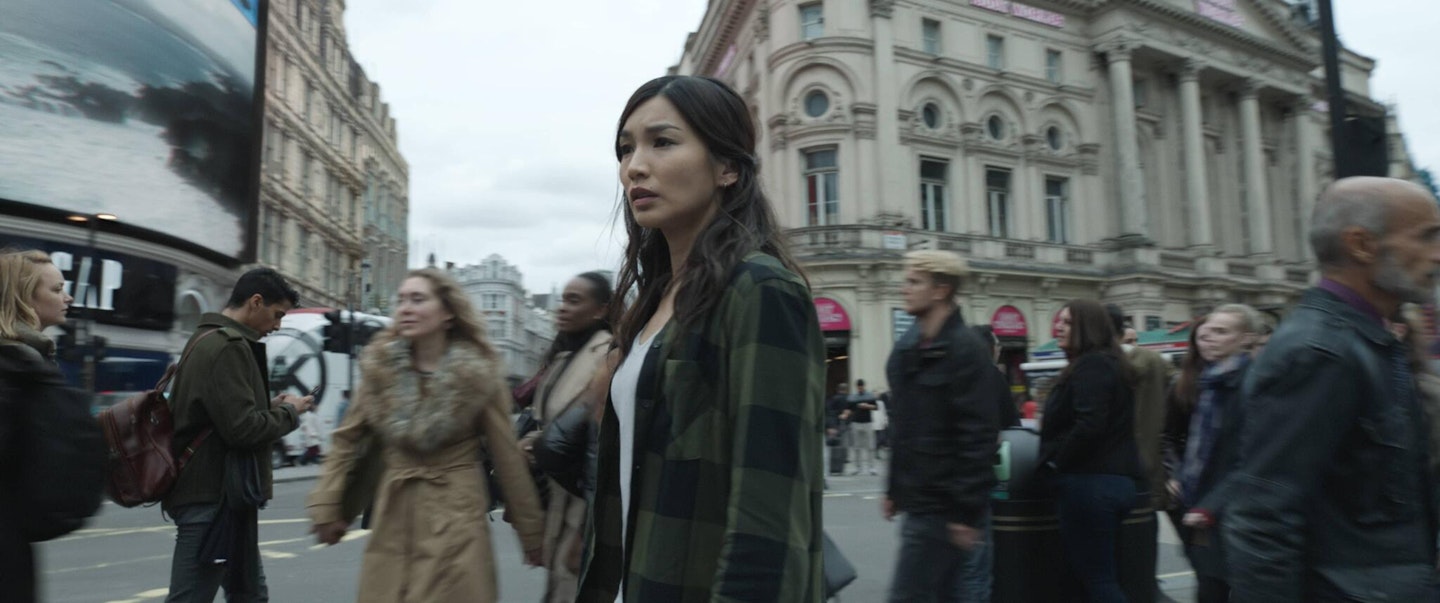
So I have to ask about the post-credit stings, and a certain Harry Styles. Can you talk about his casting as Eros? And why, even though he's a brother of Thanos, he's not purple and massive?
I can tell you why! Long story short, with that depressing ending, at some point he was going to be one of the Eternals on that ship. And that didn't quite work out. But I had been wanting to bring Eros into the MCU. So I kept mentioning it to Kevin [Feige] at every chance I had in the hallway, because I love the idea of Eros being another Eternal, another Ajak. He's an Eternal, and he was stationed on Titan – 10 of them were, just like the 10 Eternals on Earth, assuming Titan is also a host planet at some point. Now, if you think about that, what influence could Eros have had on the inhabitants of Titan, the way Ajak has influenced people on Earth? And how that has affected Thanos?
If you go to the comics, there's some quite beautiful, heartbreaking influence Eros has had on Thanos. And how much does Thanos know? I love him as a character. It makes my imagination go crazy thinking, 'Why does Thanos think this way? Why is he worried about overpopulation and destroying his planet?' Think about the emergence – does Eros know about it? Maybe if he's an advisor, the way Ajak advised kings and queens on Earth? It gets my imagination going. For me, the backstory of Eros is that he deserted, he said, "I'm not doing this anymore." So he somehow got that sphere, which you saw in his hand, and he ran off and made Pip the troll. They're like Han Solo and Chewie. Arishem's been looking for him, and he's just been a space outlaw. That's the character I had in my mind. But I never said once to Kevin, "Here's the character. Let's find an actor." For me, it was a package deal. It's got to be Harry. That's how I pitched it to Kevin.
I have to ask about that voice we hear at the end.
You know who that voice is, right? Everybody knows! It's Mr. Blade himself!
You've blown my mind!
I gotta say, in just the little time I spent with Mahershala, I can't wait for the Blade movie to come out. It's gonna be epic.
